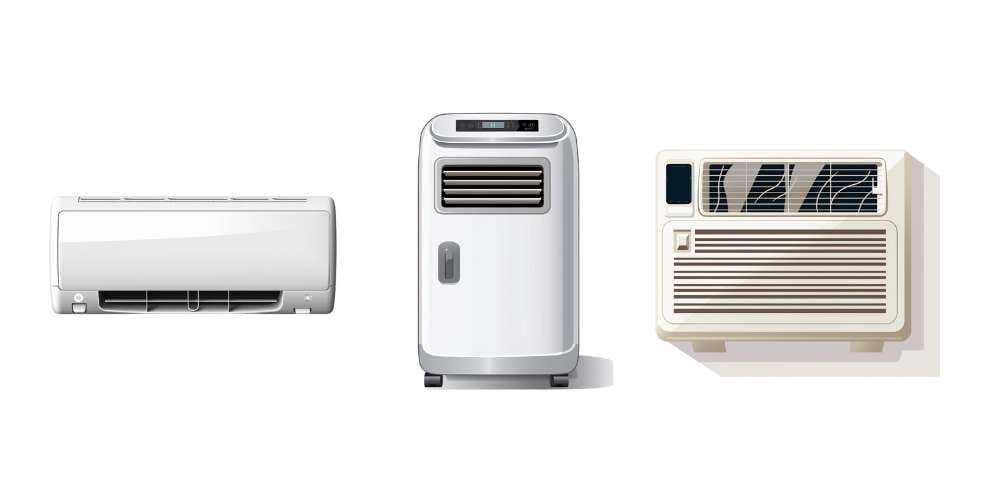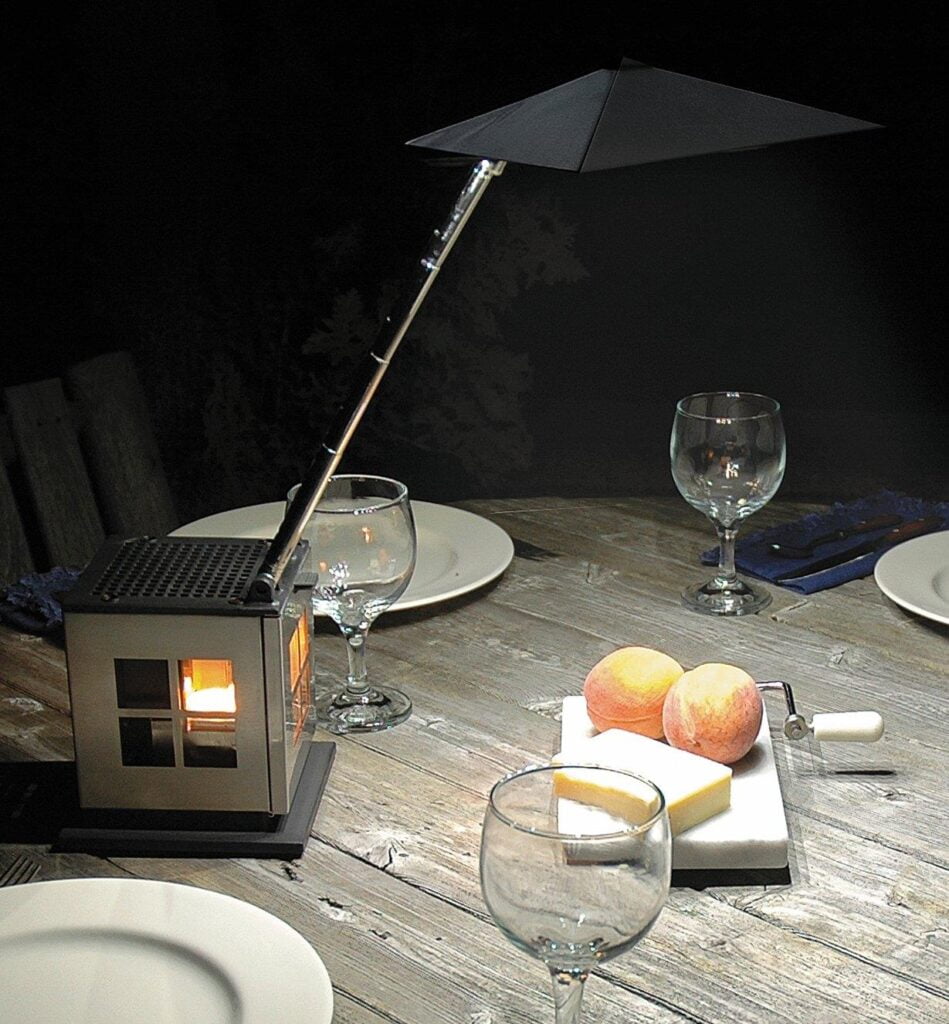Choosing the right AC for your living space can make a world of difference to your comfort throughout the day and give you a much better nights rest. This guide will help you understand the various types of AC units for apartments, to find the perfect match for your cooling needs.
Some other resources I’ve found on this topic sometimes include more or fewer types, as they might combine similar types or split them into subtypes. However, in my opinion, these are the seven most important ones to be aware of for apartment living.
The 7 Types of AC Units For Apartments
Window Air Conditioners
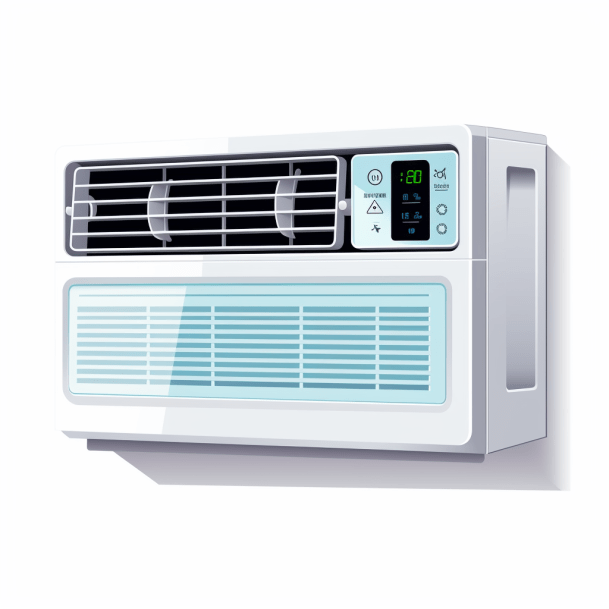
Window units are a common type of air conditioner for apartments. As the name suggests, they are installed in a window and are designed to cool a single room.
Window air conditioners are a great option for cooling your apartment but will not be a viable option to everyone as it depends on your apartment and windows as to if they can be installed or not.
Advantages of window air conditioners include their adaptability in terms of coverage area. Smaller units can efficiently cool a room of 150 square feet, while larger ones can cater to rooms around 550 to 800 square feet. Additionally, many modern units come with smart features, such as scheduling functions, eco modes, and Wi-Fi connection, allowing for personalization and easier control.
However, there are also some considerations when opting for window air conditioners. These include the size of your window, as units need to fit securely within your window pane. Deciding whether to remove the unit at the end of summer or keep it installed year-round can also be a concern, as the latter may cause drafts during colder months. The condensation from these AC units also needs to be drained, often requiring additional set up.
Window are conditioners are generally quite efficient in terms of cooling output, being much better than evaporative coolers, mostly better than portable ac units, but below central ac units and mini split ac units.
As for electricity usage, they generally use less electricity than other types of ac units but it highly depends on the frequency of use.
Pros
- Affordability: Compared to central air conditioning systems, window air conditioners are often more affordable to purchase and install.
- Targeted Cooling: These units are excellent for cooling specific rooms or areas rather than the entire apartment, making them a more efficient choice if you only need to cool a small area.
- Ease of Installation: Window air conditioners are typically easier to install compared to other more permanent types of ac units.
- Smart Features: Modern window units often come equipped with smart features such as scheduling, eco modes, and Wi-Fi connectivity for better control and convenience.
Cons
- Window Size: The size of your window can limit the type and size of the air conditioner unit you can install.
- Blockage of Window: The installed unit will take up a significant portion of your window, limiting the amount of natural light in the room and potentially obstructing views.
- Potential Drafts: If you decide to leave the unit in your window year-round, it could lead to drafts in colder months.
- Noise: Window air conditioners can be noisier than other types of AC units, which might disturb your peace, particularly during quiet times.
- Electrical Considerations: You’ll need to ensure that your home’s electrical system can support the unit, especially if it shares a circuit with other appliances.
- Condensation Drainage: These units pull moisture from the air, requiring a proper drainage system to prevent water damage.
Portable Air Conditioners
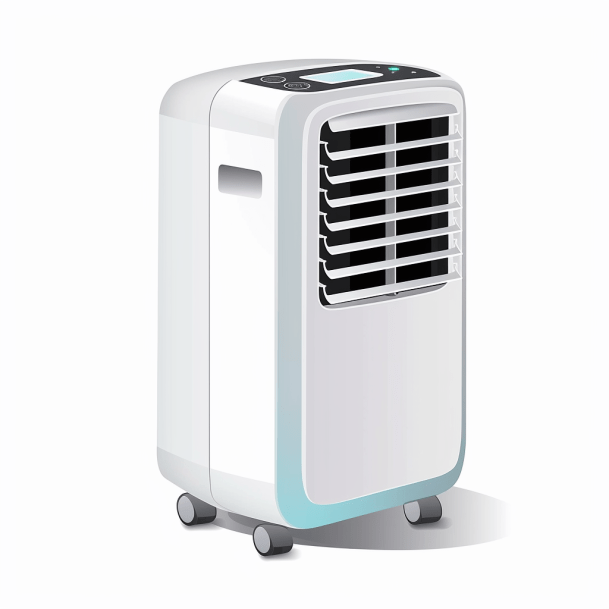
Portable AC units are another common option for apartment cooling solutions. They are standalone appliances that can be moved from room to room, providing cooling where needed.
While portable air conditioners are a flexible choice for apartment cooling, their effectiveness and efficiency can be influenced by several factors, making them a more suitable option for certain situations over others.
Advantages of portable air conditioners include their portability and flexibility. Given their design, they can be moved easily between rooms as needed, providing cooling flexibility that fixed units do not offer. They can effectively cool rooms ranging from 150 to 500 square feet. Plus, similar to window units, newer portable AC models often come with smart features like scheduling options, eco modes, and Wi-Fi capabilities for personalized control.
However, considerations when selecting portable AC units include factors such as ventilation, noise, and capacity. Since these units vent hot air through a hose, they require a nearby window or custom venting solution. While they can be quieter than window units, they may still produce some level of noise.
When it comes to how efficient they are at cooling your apartment, portable air conditioners typically fall somewhere in the middle. They perform much better than evaporative coolers but may not cool as effectively as window AC units or central AC units.
As for electricity usage, they tend to consume slightly more energy than comparable window units.
Pros
- Portability: One of the main advantages of portable air conditioners is their mobility. You can move them between rooms based on your cooling needs.
- No Installation Needed: Unlike window units, portable air conditioners don’t require installation in a window, making setup easier and more flexible.
- Smart Features: Like modern window units, many portable ACs also come with smart features, such as scheduling, eco modes, and Wi-Fi connectivity.
Cons
- Ventilation Requirements: Portable AC units need to vent hot air out of the room, usually through a window. You’ll need to ensure you have a suitable place to run the exhaust hose.
- Noise: While portable air conditioners can be quieter than window units, they still produce noise, which could be bothersome in quiet settings.
- Energy Efficiency: While they are effective at cooling, portable air conditioners generally consume slightly more energy than comparable window units.
- Cooling Capacity: While they can cool large rooms, portable air conditioners are most effective for smaller spaces or for spot cooling. The cooling effect might not be as pronounced in larger areas.
Split System Air Conditioners (Ductless Mini-Split)
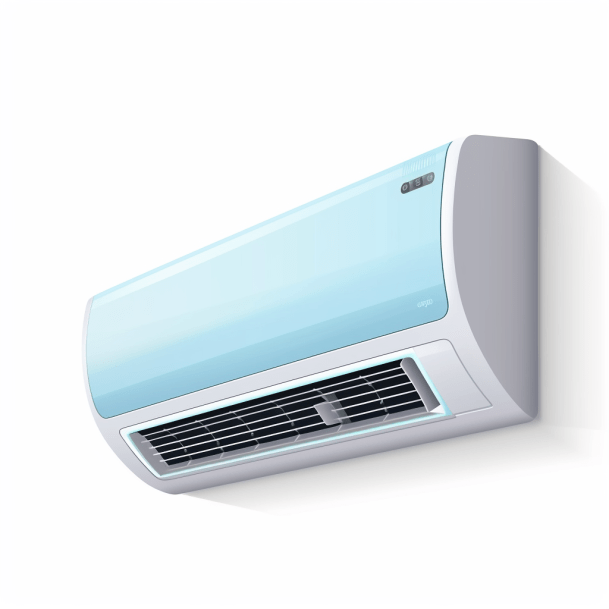
Ductless mini-split air conditioners, commonly referred to as split system air conditioners, provide a versatile solution for apartment cooling. Unlike window and portable units, these systems feature two separate components: an indoor unit that dispenses cool air and an outdoor unit that houses the compressor. Because of this, these type of ac units are usually installed in the build stage of apartments.
Advantages of ductless mini-split systems are numerous. They offer great flexibility with regard to the installation location and can cool larger spaces more efficiently than portable or window units, making them suitable for apartments up to 1,000 square feet or more. Modern mini-split units also incorporate smart features like scheduling, eco modes, and Wi-Fi connectivity for tailored control.
However, certain considerations must be kept in mind when opting for mini-split air conditioners. They require a more complex installation process than portable or window units, usually requiring professional assistance. The indoor units must be mounted on a wall or ceiling and connected to the outdoor unit via a conduit that houses the power cable, refrigerant tubing, and a condensate drain.
In terms of cooling efficiency, split system air conditioners outperform both portable and window AC units, providing superior cooling capability. They are closer to central air conditioning in their effectiveness.
As for electricity usage, split systems are highly efficient, often using less electricity than other types of AC units for the same cooling performance. As always, the actual consumption will depend on the model and usage.
Pros
- Efficiency: Split system air conditioners are highly efficient at cooling larger spaces.
- Quiet Operation: Since the noisy components are located outside, these units are quieter than both window and portable AC units.
- Flexible Installation: The indoor units can be mounted on walls or ceilings, allowing for more installation flexibility.
- Smart Features: Modern units often come with smart features like scheduling, eco modes, and Wi-Fi connectivity.
Cons
- Installation: Usually installed during the build of apartments. These units require professional installation, which can increase initial costs.
- Cost: Upfront costs for split system air conditioners are typically higher than those for portable or window units.
- Aesthetics: The indoor unit of a mini-split system can be more visually intrusive than a window or portable unit. But not always!
- Outdoor Space: You’ll need space to install the external unit, which may not be feasible for some apartment dwellers.
Central Air Conditioning
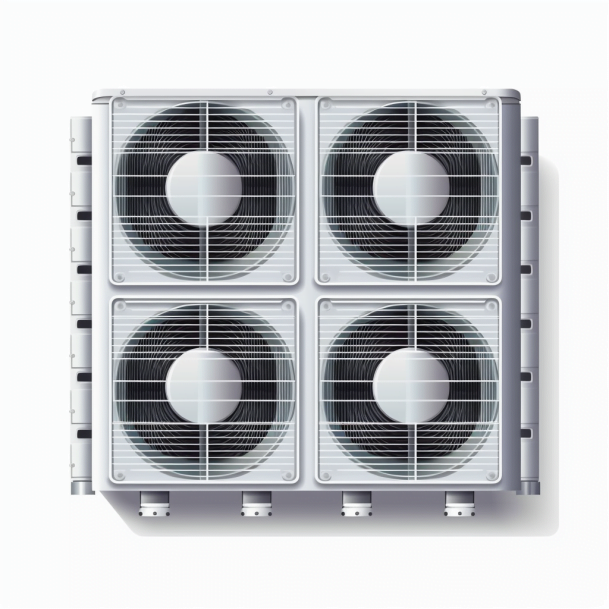
Central air conditioning is a comprehensive cooling solution typically used in larger residences. This type of air conditioning system cools your entire living space evenly through the use of air ducts in the apartment or house.
Central AC can be an great way to cool an apartment, but it requires the availability of ductwork, making it more suitable for larger apartments or multi-story buildings, and installation is usually done during the build stages of the apartment.
Advantages of central air conditioning will include the excellent cooling performance and ability to have uniform temperature distribution. A single central AC unit is also able to cool the entire residence, making it ideal for apartments larger than 1,000 square feet. Newer central air systems usually come with all the extra bells and whistles as well like Wi-Fi connectivity, scheduling, compartmentalized cooling, etc.
As you can probably imagine, there are a few minor things to bear in mind when choosing central air conditioning (okay, maybe major things). One being, these things need to be planned out in advance. They are complex to install and professionals need to do it. They’re also more expensive.
In terms of cooling efficiency, central air conditioners are considered the most effective and efficient, providing superior cooling capability across a larger area.
When it comes to how much juice you’ll use, central air conditioning systems are generally more energy-efficient than other types of AC units for large spaces, but they can also lead to higher energy bills due to their capacity to cool the entire residence.
Pros
- Cooling Capacity: Central air conditioning systems can cool larger spaces more effectively than other types of AC units.
- Uniform Cooling: These systems provide a consistent temperature throughout the apartment, avoiding hot and cold spots.
- Quiet Operation: Since the compressor is located outside the building, central air conditioners operate quietly within the living space.
- Smart Features: Modern systems often offer smart features for personalized control, such as scheduling, eco modes, and Wi-Fi connectivity.
Cons
- Installation: Central air conditioning requires professional installation and the existence of ductwork, which can be complicated and expensive.
- Cost: These systems are generally more expensive than other types of AC units in terms of both purchase price and installation costs.
- Energy Consumption: While central air conditioning systems are efficient for large spaces, they can result in higher energy bills if used to cool small spaces or if used inefficiently.
- Maintenance: Central air conditioning systems require regular maintenance, including duct cleaning and component checks, which can add to their overall cost.
Through-the-Wall Air Conditioners
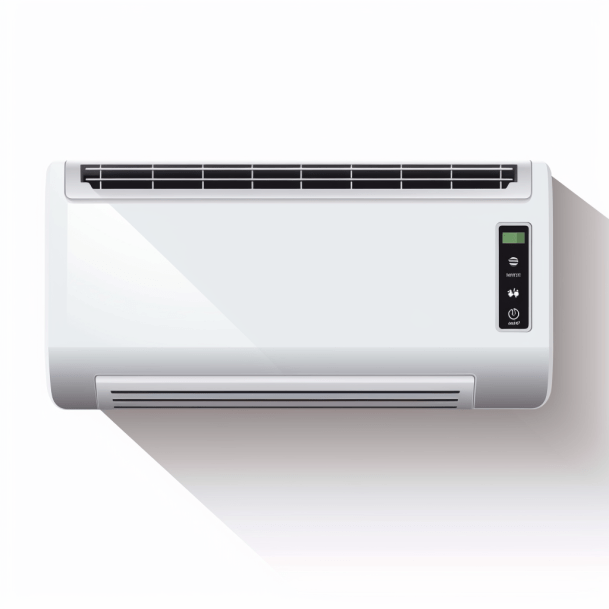
So this type of AC unit is kind of similar to a window ac unit but involves more installation and is most likely not the option for your apartment if you already live there as they will require a hole through your wall outside.
Their advantages are their efficient cooling and space-saving design. They can cool rooms from 150 to 800 square feet and sometimes even more, depending on the BTU rating of the model.
There are, however obviously, some considerations when opting for through-the-wall air conditioners. They require a hole in the wall for installation, which may not be feasible or allowed in some apartments. On top of that they are typically more expensive and consume more energy than window units due to their larger size and cooling capacity. Bummer.
As you might have guessed, these perform similar to window as units in terms of cooling performance. They will generally use more electricity than window units, however.
Pros
- Efficiency: Highly efficient at cooling individual rooms or specific areas.
- Space-Saving: As they are installed in the wall, they do not obstruct windows or take up floor space.
Cons
- Installation: These units require professional installation and a hole in the wall, which may not be doable in some apartments.
- Cost: Generally more expensive than other types of AC units due to their installation complexity.
- Energy Consumption: While effective at cooling, wall mounted air conditioners can consume slightly more energy than comparable window units.
- Aesthetics: The presence of the unit on the wall can be more visually intrusive than a window or portable unit.
Evaporative Coolers (Swamp Coolers)
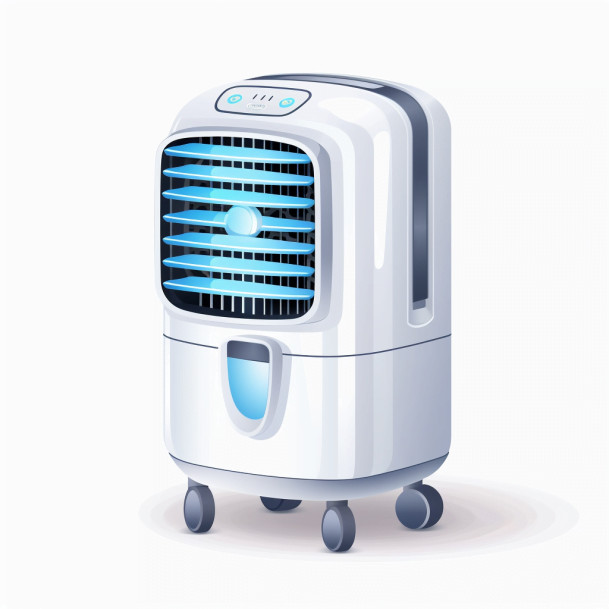
Evaporative coolers, AKA swamp coolers or ventless air conditioners, are a unique type of ac that use the process of evaporation to cool the air. This means they need a dry climate to perform adequately.
The good thing about these (even though I don’t have much in that regard), is that they are energy efficient and are super portable. You could use some of these in a tent!
The main things to consider with these are they don’t work well in places that are humid and will make the air more damp and sticky. In other words, more uncomfortable then before. You also need a constant supply of water to run these bad boys.
For cooling efficacy I would give these an F. Honestly. Sometimes even a simple fan is better.
When it comes to electricity, evaporative coolers are some of the most energy-efficient cooling options, using significantly less electricity than many other types of air conditioners.
Pros
- Energy Efficiency: Consume less electricity and are better for the environment.
- Cost-Effective: They are usually cheaper than other ac units.
- Portability: Most of these are very portable.
- Air Quality: Already have a humidifier? Well these work on the same principle and can improve air quality.
Cons
- Climate Dependent: These work decent in dry climates and awful in humid climates.
- Water Consumption: These units require a continuous supply of water to operate.
- Limited Cooling: They can’t cool like other types of AC can. Usually, not even close.
- Humidity: These will increase humidity in the air and make it feel extra damp. Not what you want if you are already hot.
Hybrid Air Conditioners
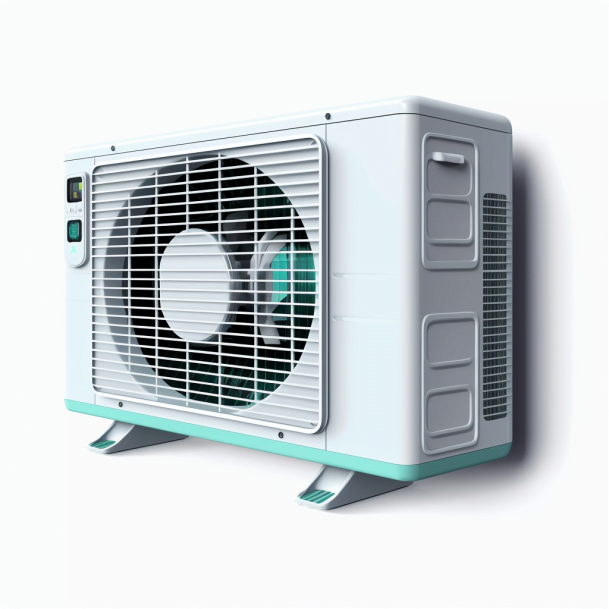
Hybrid air conditioners, AKA dual fuel AC, are a more modern type of solution that work – as the name implies – with multiple fuel sources. Usually alternating between electricity and burning fuels such as gas.
Whether you can use this type of AC mostly depends on the building’s HVAC infrastructure, regional climate, and the individual’s energy-saving priorities.
They are flexible as they can change between fuel sources. By using the most efficient fuel source based on the temperature, they can significantly reduce energy costs.
These perform excellent in terms of cooling however, comparable to central ac, with effective cooling for the entire apartment.
Pros
- Energy Efficiency: Hybrid air conditioners can be more energy-efficient than comparable AC systems due to their ability to optimize the energy source based on weather conditions.
- Cost Savings: Over time, the energy savings from a hybrid air conditioner can offset the higher initial investment, leading to lower total costs.
- Adaptability: Hybrid AC can automatically switch between electric and gas power to maximize efficiency based on weather conditions.
Cons
- High Upfront Cost: Hybrid air conditioners usually cost more initially.
- Installation Complexity: They require professional installers and potential modifications to the existing HVAC system.
- Maintenance: Hybrid systems can be more complex to maintain due to their dual energy source.
Conclusion
In summary, there’s a vast array of types of AC units for apartments – window, portable, ductless mini-split, central, through-the-wall, evaporative coolers, and hybrid systems, each with its unique features, pros, and cons.
However, if you’re searching for this topic, there’s a good chance you’re leaning towards a portable air conditioner. These are an excellent, flexible choice, particularly for apartment dwellers.
But remember, the best AC for your needs will depend on various factors, including your apartment’s size, layout, and the local climate. So, weigh your options carefully, and ensure the choice you make ultimately adds comfort and value to your apartment living.
Hi, I’m Carmine, the guy behind Helpful Tiger. Tired of crappy search results? Me too. That’s why I started this website. It’s a one-stop shop for simple tutorials and guides on a little bit of everything. Have questions? Reach out, and I’ll do my best to help!

